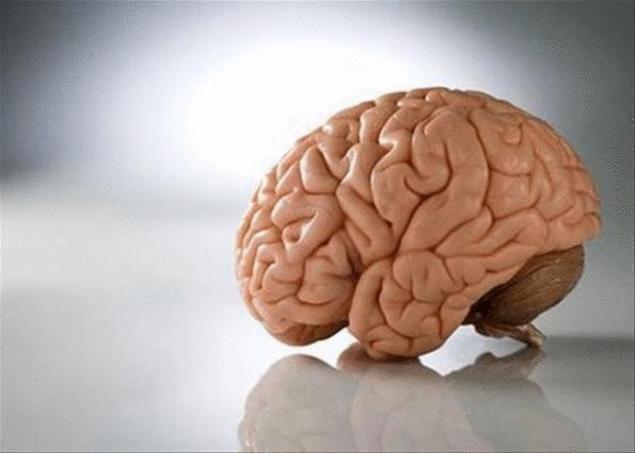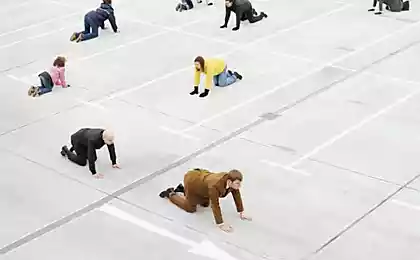480
10 techniques to prevent degradation of the mind.
Have you noticed that the older you get, the less willing to undertake the work, which is unusual for you, or is associated with a high concentration of attention and exploration of unfamiliar skills?
Let me tell you a little secret. Reading favorite Newspapers (authors), work on a familiar profession, the use of the mother tongue and communication with friends who understand you well, a visit to a favourite restaurant, watching a favorite series... it is so favorite by all of us, leads to the degradation of the brain.
Your brain is a lazy bastard, and therefore seeks to reduce the energy cost of the activity by creating a kind of "macros" — programs that you run on templates.

Biologist Richard Simon in the early nineteenth century, called the program "engrams" — a physical habit or memory trace left by repeated exposure to a stimulus. Engrams can be represented in the form of paths that neurons "tread" in your brain, performing the same action. The longer we do it, the less energy it takes for our brain.
Sometimes these paths turn into roads and then into the highways, such as the Chinese in this, gathering a deck of cards faster than the robot:
On the one hand, it's great superpowers — indeed, why spend extra energy to perform the same type of action? However, the flip side of this ability — the reduction of plasticity of the brain.
The fact that the longer we use engrams, the less work the basal ganglia in the brain. Their main function is to produce the neurotransmitter acetylcholine, which helps neurons cuts new paths among the noise of our brain (about what you have going on now, after reading this sentence).
Think your way to work or school. If you are driving on the same route more than six months, then your actions become so automatic that in parallel you can perform other actions — to read, listen to music, answer emails. At your favorite restaurant you don't have to cough up acetylcholine and think about what you take for lunch, you already know by heart the entire menu. Behind the fake smile you will immediately recognize the alarm, and you will not need to strain in order to decipher these communication signals.
It would seem, why all this change? And then, what is our life — a continuous source of changes beyond our control. To most of them we have to adapt, and in this "race." survival of the one who faster the others will change their color in the color environment and will have an opportunity to sneak up on the insect.
You can shorten (like it did recently with thousands of doctors); the tasks of your Department may change and you will need to master new skills (and if you fail, you, again, cut); you will fall in love with a Chinese woman and want to learn the Dungan language spoken by her relatives, and so on.
Therefore, the plasticity of the brain must constantly maintain and train. Imagine that your brain is concrete, which after some time hardens.
The image of the "hardened" brain you'd get it, if you look at the most 70 year old men, unable to master the timer on the microwave, the perceiver hostility is all new, years of performing the same actions (or reproducing patterns of thinking). These "paths" in their heads turned in burrows and tunnels in the rocks, and a "breakthrough" in the next cave passage is almost impossible.
Your task — to constantly stir this "mental mix" and not allow it to harden. Once we relax and begin to use engrams, some part of our brain freezes and we don't even notice it.
What to do in order to stop the degradation of the brain
You can highlight the top ten most simple but quite effective, methods:
1. Take care of yourself
If you suddenly felt uncomfortable with the fact that something is wrong (for example, your favorite website has changed the design or in the shop disappeared favorite yogurt) uzaite this feeling by the tail and start his "spin". Why not try all the yogurt or not to start making your own?
2. Do not re-read already read the book
Not to revise already viewed films. Yes, this is a very nice psychological feeling to plunge into the cozy world, in the lives of familiar characters, no surprises, you already know the end and can enjoy the little things that first time did not notice swallowing a book for an hour (or reviewing the season over the weekend). But at the same time you take in new books and movies a chance to discover something completely new, depriving your brain of alternative education of neural connections.
3. Look for new routes
Try to look for new routes to familiar way home and back to find alternative shops, cinemas and other infrastructure point on the map of your life. It may take more time, but can bring a nice bonus — for example, lower prices in the stores or less people in the theater.
4. Look for new music
If you are an audiophile, in your iPod, tens of thousands of songs, and you think your taste is very rich and varied, then hasten to disappoint you — most often we listen to 50-100-known tracks, pleasant to us all for the same reasons — we adapted to them, and our brain do not need to spend additional resources for their processing and comprehension.
In a world of hundreds of thousands of Internet radio stations, and even if every day to switch to a new, still our life is not enough to listen to them all.
5. Looking for new friends and acquaintances
Yes, it is, of course, great when you have friends that like to gather every Friday and discuss football or a new dress Beyonce. Psychologically comfortable.
But most of us live in Metropolitan areas, why limit your circle of 4-5 people, and most often not chosen by us, and "imposed" circumstances — school, College, work?
Social tools embedded in us greatly affect our way of thinking, and sometimes it happens that we, under the influence of certain friends, change our point of view, a set of interests, and sometimes even occupation.
6. Get children
Children are a permanent source of chaos and uncertainty in your life. They — live "mixers" in your head, destroying all the templates and reshapes your established routes in new ways.
I have three sons of various ages, who every day bring something new to your issues, behaviour, inquisitive mind and continuous experiments with everything around. You will not notice how your thinking liberated and you will begin to think differently.
If you have kids you still can not, then you can start with a dog. It firstly requires walking (and fresh air is good for the brain). Second, it draws you into an involuntary contact with other dog lovers. And third, can also be a source of chaos (mine, for example, when running for the flies, not paying much attention to the obstacles encountered in its path).
7. Stop criticize
"What a terrible design!", "How disgusting they made a separation!", "How uncomfortable to sit in these new chairs!", — these and millions of other messages in Facebook, from the mouths of your colleagues and your own are indicators of resistance to change, suddenly coming to life. The changes, which often you can't change. Or you can, but put a lot of effort, are not worth it. Agree, because there are more interesting things to do than to require restaurant complaints book and write slander on hamovatogo waiter?
Much more useful for your own development will make these changes and to motivate the brain to continue to live in a new reality.
Your dialog should look something like this: "the New menu? Okay, some old dishes have become boring," "The new road repair, you need to look for a detour? Okay, so after a month there will be no such bumps, and while there is a repair, I know about the area something new!", "The new operating system? Super! I now have a new entertaining quest — find the control panel!"
8. Stop hanging on people "shortcuts"
It's very useful instead to understand the person, to think about why he did it — to give in to it and just "branded" it, by attaching to one or another psycho. Unfaithful to her husband? Whore! Drinks with friends? Alcoholic! Watching "Rain"? Belolentochnik!
Each of us is under the influence may be even greater pressure of circumstances, than the same Rodion Raskolnikov, however, many find his reflections described by Dostoevsky, interesting, and neighbor-divorcee with two children — something vulgar and not worthy of attention.
9. Experiment with flavors
Despite the fact that evolution is replaced by the second plan, our olfactory receptors, odours still have a huge impact on us. And if you have a favorite perfume that you do not change for years, it's time to change it. And do it with some frequency.
10. Learn foreign languages
And it's not necessary to fall in love with the Chinese, you can find another motivation, related, for example, with professional interests or Hobbies. Foreign words and related semantic fields are often different from your native language, and their study is perhaps the most effective tool for training the plasticity of the brain (especially if you move further away from the tourist lexicon, and delve into cultural features).
We should not forget that our brain is much more complicated than many people think. Engrams associated with listening to the same music, affect the way we communicate with friends. Unexpected sensation of the smell of food in the new restaurant can awaken in you a desire to overestimate the words and deeds of a loved one (to understand and forgive). A walk after work on an unfamiliar street to push the idea on how to find a suitable solution to the problem that arose at work. Therefore, the above life hacking is best combined.
And maybe, one day, after 30 years of commercials, when your grandson bring you your new gadget, representing a cloud of nano-robots, you do not say, "O God, remove from me this buzzing crap!", and will dip his hand with the words "Wow!" and immediately ask "And how does it work and where is possible to buy?".
P. S. And remember, just changing your mind — together we change the world! ©
Source: vk.com/golovolomke
Let me tell you a little secret. Reading favorite Newspapers (authors), work on a familiar profession, the use of the mother tongue and communication with friends who understand you well, a visit to a favourite restaurant, watching a favorite series... it is so favorite by all of us, leads to the degradation of the brain.
Your brain is a lazy bastard, and therefore seeks to reduce the energy cost of the activity by creating a kind of "macros" — programs that you run on templates.

Biologist Richard Simon in the early nineteenth century, called the program "engrams" — a physical habit or memory trace left by repeated exposure to a stimulus. Engrams can be represented in the form of paths that neurons "tread" in your brain, performing the same action. The longer we do it, the less energy it takes for our brain.
Sometimes these paths turn into roads and then into the highways, such as the Chinese in this, gathering a deck of cards faster than the robot:
On the one hand, it's great superpowers — indeed, why spend extra energy to perform the same type of action? However, the flip side of this ability — the reduction of plasticity of the brain.
The fact that the longer we use engrams, the less work the basal ganglia in the brain. Their main function is to produce the neurotransmitter acetylcholine, which helps neurons cuts new paths among the noise of our brain (about what you have going on now, after reading this sentence).
Think your way to work or school. If you are driving on the same route more than six months, then your actions become so automatic that in parallel you can perform other actions — to read, listen to music, answer emails. At your favorite restaurant you don't have to cough up acetylcholine and think about what you take for lunch, you already know by heart the entire menu. Behind the fake smile you will immediately recognize the alarm, and you will not need to strain in order to decipher these communication signals.
It would seem, why all this change? And then, what is our life — a continuous source of changes beyond our control. To most of them we have to adapt, and in this "race." survival of the one who faster the others will change their color in the color environment and will have an opportunity to sneak up on the insect.
You can shorten (like it did recently with thousands of doctors); the tasks of your Department may change and you will need to master new skills (and if you fail, you, again, cut); you will fall in love with a Chinese woman and want to learn the Dungan language spoken by her relatives, and so on.
Therefore, the plasticity of the brain must constantly maintain and train. Imagine that your brain is concrete, which after some time hardens.
The image of the "hardened" brain you'd get it, if you look at the most 70 year old men, unable to master the timer on the microwave, the perceiver hostility is all new, years of performing the same actions (or reproducing patterns of thinking). These "paths" in their heads turned in burrows and tunnels in the rocks, and a "breakthrough" in the next cave passage is almost impossible.
Your task — to constantly stir this "mental mix" and not allow it to harden. Once we relax and begin to use engrams, some part of our brain freezes and we don't even notice it.
What to do in order to stop the degradation of the brain
You can highlight the top ten most simple but quite effective, methods:
1. Take care of yourself
If you suddenly felt uncomfortable with the fact that something is wrong (for example, your favorite website has changed the design or in the shop disappeared favorite yogurt) uzaite this feeling by the tail and start his "spin". Why not try all the yogurt or not to start making your own?
2. Do not re-read already read the book
Not to revise already viewed films. Yes, this is a very nice psychological feeling to plunge into the cozy world, in the lives of familiar characters, no surprises, you already know the end and can enjoy the little things that first time did not notice swallowing a book for an hour (or reviewing the season over the weekend). But at the same time you take in new books and movies a chance to discover something completely new, depriving your brain of alternative education of neural connections.
3. Look for new routes
Try to look for new routes to familiar way home and back to find alternative shops, cinemas and other infrastructure point on the map of your life. It may take more time, but can bring a nice bonus — for example, lower prices in the stores or less people in the theater.
4. Look for new music
If you are an audiophile, in your iPod, tens of thousands of songs, and you think your taste is very rich and varied, then hasten to disappoint you — most often we listen to 50-100-known tracks, pleasant to us all for the same reasons — we adapted to them, and our brain do not need to spend additional resources for their processing and comprehension.
In a world of hundreds of thousands of Internet radio stations, and even if every day to switch to a new, still our life is not enough to listen to them all.
5. Looking for new friends and acquaintances
Yes, it is, of course, great when you have friends that like to gather every Friday and discuss football or a new dress Beyonce. Psychologically comfortable.
But most of us live in Metropolitan areas, why limit your circle of 4-5 people, and most often not chosen by us, and "imposed" circumstances — school, College, work?
Social tools embedded in us greatly affect our way of thinking, and sometimes it happens that we, under the influence of certain friends, change our point of view, a set of interests, and sometimes even occupation.
6. Get children
Children are a permanent source of chaos and uncertainty in your life. They — live "mixers" in your head, destroying all the templates and reshapes your established routes in new ways.
I have three sons of various ages, who every day bring something new to your issues, behaviour, inquisitive mind and continuous experiments with everything around. You will not notice how your thinking liberated and you will begin to think differently.
If you have kids you still can not, then you can start with a dog. It firstly requires walking (and fresh air is good for the brain). Second, it draws you into an involuntary contact with other dog lovers. And third, can also be a source of chaos (mine, for example, when running for the flies, not paying much attention to the obstacles encountered in its path).
7. Stop criticize
"What a terrible design!", "How disgusting they made a separation!", "How uncomfortable to sit in these new chairs!", — these and millions of other messages in Facebook, from the mouths of your colleagues and your own are indicators of resistance to change, suddenly coming to life. The changes, which often you can't change. Or you can, but put a lot of effort, are not worth it. Agree, because there are more interesting things to do than to require restaurant complaints book and write slander on hamovatogo waiter?
Much more useful for your own development will make these changes and to motivate the brain to continue to live in a new reality.
Your dialog should look something like this: "the New menu? Okay, some old dishes have become boring," "The new road repair, you need to look for a detour? Okay, so after a month there will be no such bumps, and while there is a repair, I know about the area something new!", "The new operating system? Super! I now have a new entertaining quest — find the control panel!"
8. Stop hanging on people "shortcuts"
It's very useful instead to understand the person, to think about why he did it — to give in to it and just "branded" it, by attaching to one or another psycho. Unfaithful to her husband? Whore! Drinks with friends? Alcoholic! Watching "Rain"? Belolentochnik!
Each of us is under the influence may be even greater pressure of circumstances, than the same Rodion Raskolnikov, however, many find his reflections described by Dostoevsky, interesting, and neighbor-divorcee with two children — something vulgar and not worthy of attention.
9. Experiment with flavors
Despite the fact that evolution is replaced by the second plan, our olfactory receptors, odours still have a huge impact on us. And if you have a favorite perfume that you do not change for years, it's time to change it. And do it with some frequency.
10. Learn foreign languages
And it's not necessary to fall in love with the Chinese, you can find another motivation, related, for example, with professional interests or Hobbies. Foreign words and related semantic fields are often different from your native language, and their study is perhaps the most effective tool for training the plasticity of the brain (especially if you move further away from the tourist lexicon, and delve into cultural features).
We should not forget that our brain is much more complicated than many people think. Engrams associated with listening to the same music, affect the way we communicate with friends. Unexpected sensation of the smell of food in the new restaurant can awaken in you a desire to overestimate the words and deeds of a loved one (to understand and forgive). A walk after work on an unfamiliar street to push the idea on how to find a suitable solution to the problem that arose at work. Therefore, the above life hacking is best combined.
And maybe, one day, after 30 years of commercials, when your grandson bring you your new gadget, representing a cloud of nano-robots, you do not say, "O God, remove from me this buzzing crap!", and will dip his hand with the words "Wow!" and immediately ask "And how does it work and where is possible to buy?".
P. S. And remember, just changing your mind — together we change the world! ©
Source: vk.com/golovolomke
Scientists have learned to control lightning
7 ignored muscles that make it difficult to gain muscle mass























